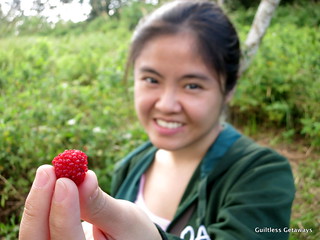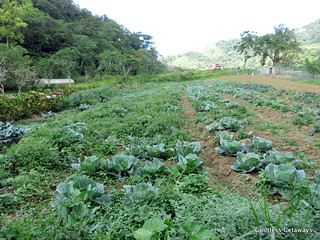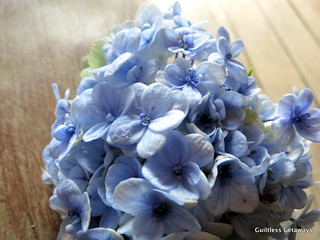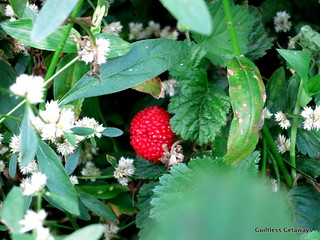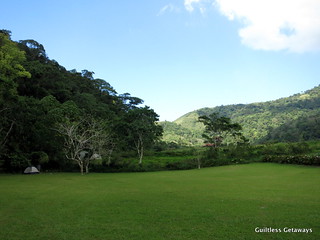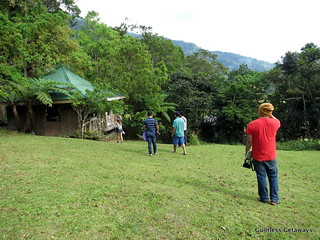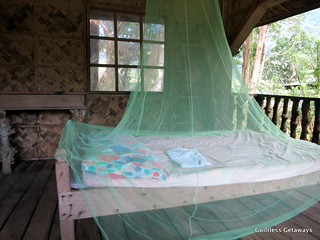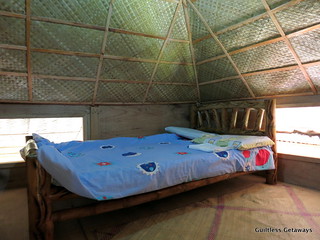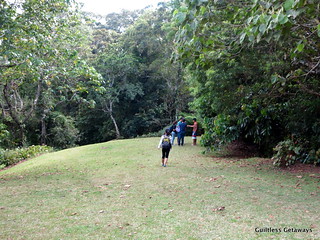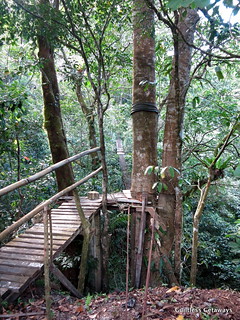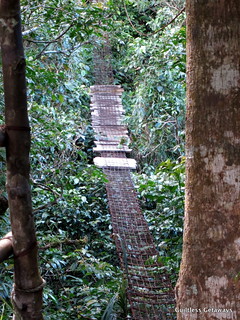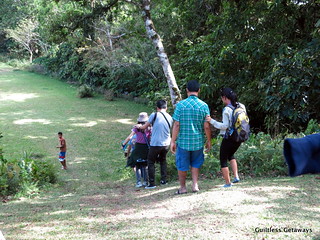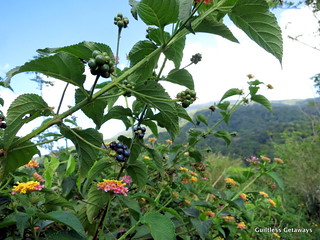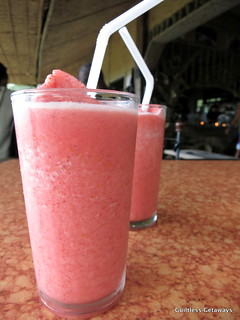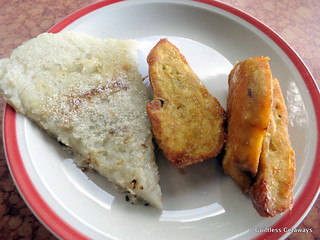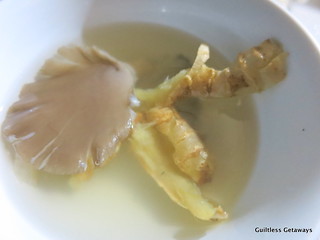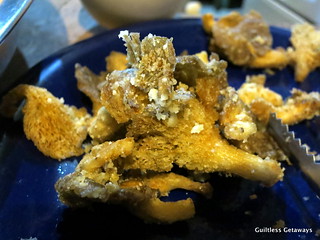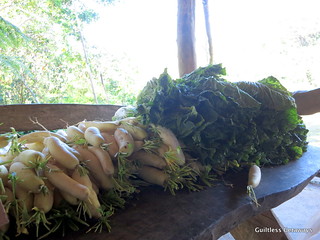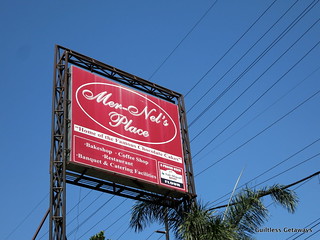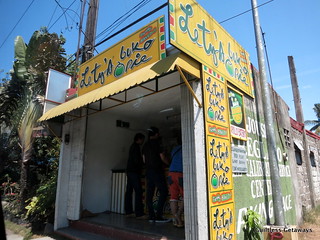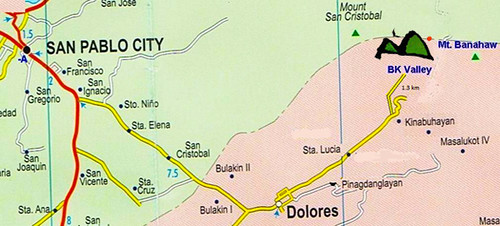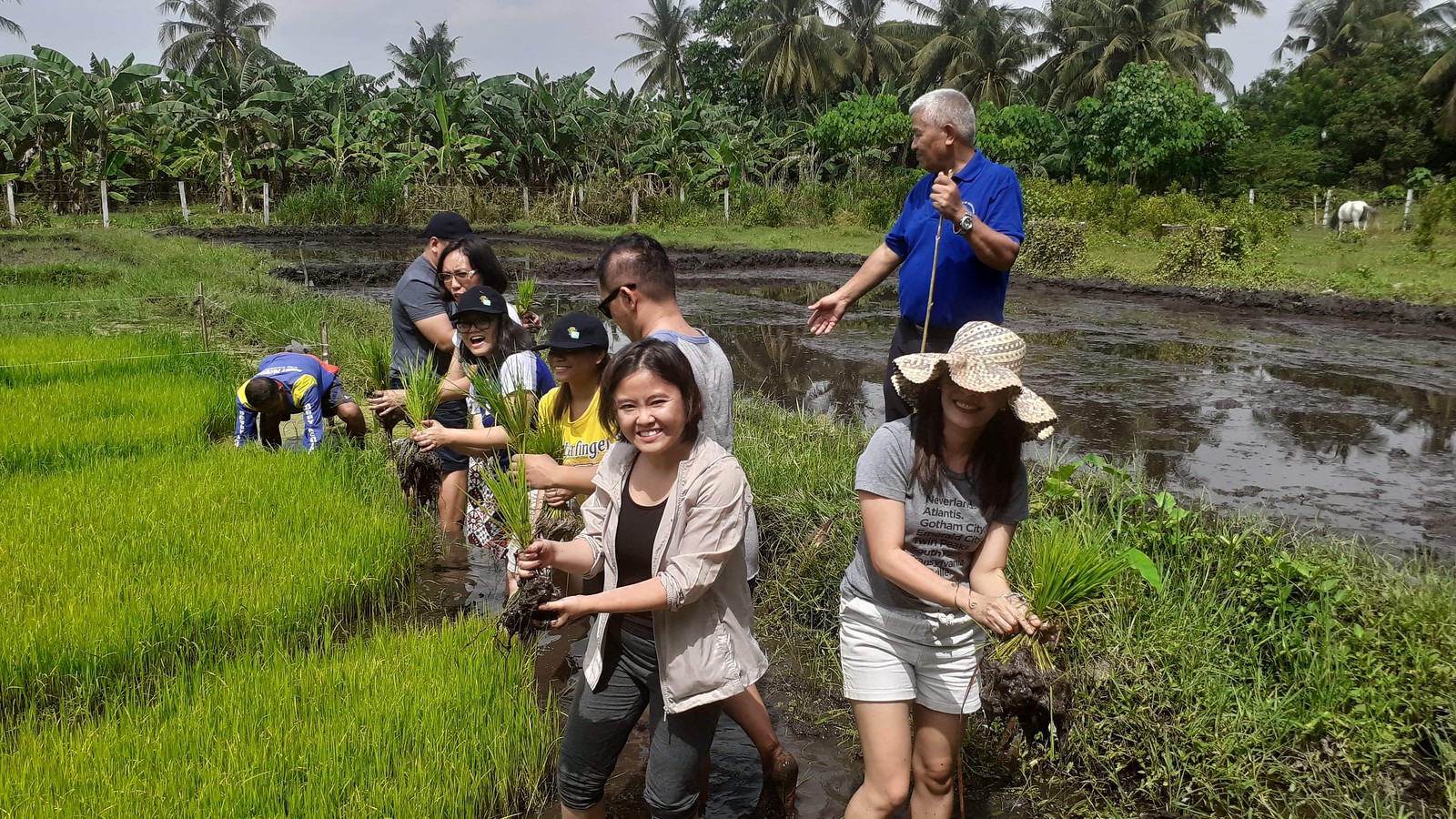When I hear "Quezon Province", I think about the colorful Pahiyas Festival and the Pancit Lucban (to which you pour one of my favorite condiments - vinegar haha). Now, my head is filled with ice-cold Organic Raspberry Shake... partly because I could probably never forget my first time in Quezon just last month! :D We had a wonderful time walking around an isolated valley, checking out oyster mushrooms and picking raspberries (then putting 'em directly into our mouths) at the Bangkong Kahoy Nature Retreat & Field Study Center in Dolores, Quezon with environmentalist Mr. Dion Pullan. I've never had fresh raspberries before and I never knew there are local raspberries called sapinit - which were tested to have higher anti-oxidants than their foreign counterparts.
Here you have organic veggies available (like what they plant in Baguio), except for carrots (which they don't like to plant here).
They also take pride in having endemic plants like the blue hydrangeas (below) and the beautiful jade vine (which I didn't have time to look for...).
Mr. Dion recognized that the money is with land and weeds. Would you believe that they used to consider the sapinit (raspberry) plants as a nuisance way back? The stems spread fast laterally and they are very thorny plants. The sapinit is part of the rose family (Rosaceae according to the book Useful Plants of the Philippines Vol. 1). The group before us had already picked from this site so Mr. Dion said he'll show us another part of the farm with a lot more sapinit growing on its own (more below). Yey!
There's a nice camping site not that far away (and still inside the property). It looks quiet, dark and peaceful here at night. I'm just not sure about mosquitoes ;) One of the main activities here is bird-watching, BTW. There are lots of stars at night too (perfect for star-gazing..)!
There's a bed downstairs with a mosquito net (kulambo)
and another one upstairs. You can rent the Antonio room for P2800 a night. I think 4 people can comfortably fit here. If you want a more luxurious type of accommodation, there's also the Bangkong Kahoy Mountain Lodge (also within the compound) =)
There's an adventure area nearby
with a hanging bridge (must wear harness) to get to the 150-meter zipline (P100 per ride).
Closeup of the hanging bridge...
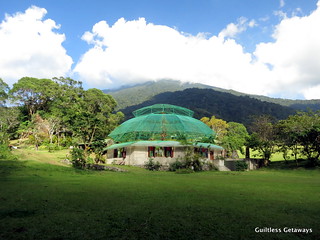
We went down a path to where the untouched sapinit were. According to the book I'm holding right now (Dietmar Rummel's Useful Plants of the Philippines), "it is found in forests at medium and higher altitudes and in very wet places, also at low altitudes from northern Luzon to Mindanao and Palawan". The fruit is considered a "remedy for bedwetting of children" while the leaves are for "diarrhea".
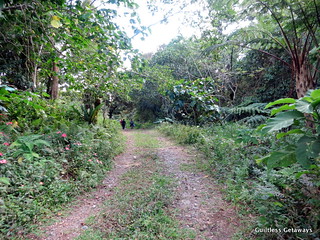
The locals here used to just slash and burn these plants. It's been found to contain lots of phytochemicals and anti-oxidants and believed to prevent Alzeimer's. Today, they harvest the berries from January to April every 3 days! They can harvest twice a week and a total of 4 tons per season at P400 per kilo. The shelf life is 1.5 days outside the farm and up to 2-3 days here. The leaves, they said, are anti-inflammatory and they make them into raspberry tea. They dehydrate the leaves and twigs now. From something that you would just throw away before, it's now become profitable at P1200 per kilo. They just cut them to this height once in a while to keep the plant in control. Other than that, BK Valley's sapinit just grows on its own and just keeps on giving.
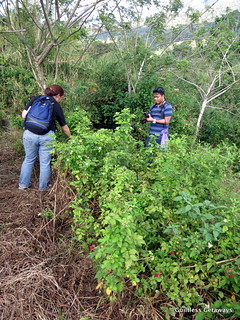
I personally was picking out berries and ate them as I went for more haha. When you trust your farmer that much and you know it's organic, then I go for it.
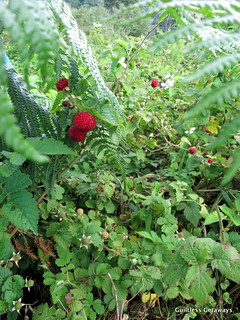
They're part of the rose family so before you can get to the hidden good ones, you're bound to get pricked from lots of thorns...

Once you find the right one, it'll easily come off with one light tug. They're bitter, succulent, sweet and sour at the same time. Very addicting...
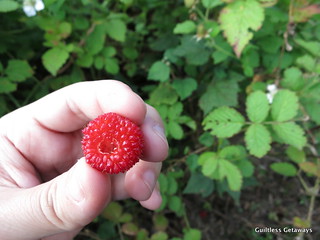
I came across Lantana flowers and berries near the sapinit shrubs. At first I thought these were the Lipote Fruit Trees that Mr. Dion was talking about (I guess I would just have to find it next time hehe). The topic of the lipote trees came about when I asked about fruit trees in the farm. I found out that Lipote (syzygium curranii, also known as igot, baligang, maligang, amhi, bahag, "seedless duhat") is endemic in the Philippines and other Pinoy's childhood memories included adding salt and sugar to it then shaking it before they eat them. I'd love to have that kind of experience! Hehe. They are considering to market Lipote berries as well.

I confess to having had 2 whole glasses of fresh raspberry shake (P60 each) to myself because I was so thirsty and was craving for more after during dinner... They put some milk and sugar into it.
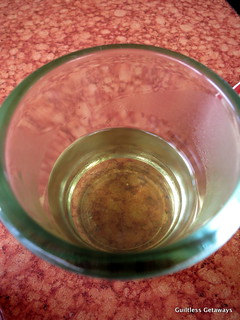
We stayed indoors at the biggest rooms they had at the BK Valley. I went up the viewdeck for a bit to catch this view and the last traces of sunset. They said we can go firefly-watching at night at BK as well (but I was spent and hadn't slept for almost 2 days..).
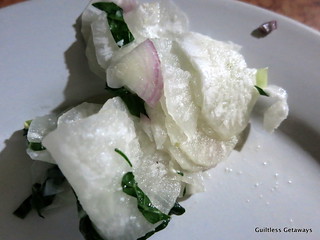
and to-die-for fried mushrooms! I tried making this with cornstarch but it just doesn't taste and look the same... =( I just have to go back there hahaha.
And just like that - it's breakfast time already!
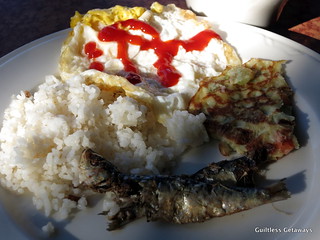
We went home with our veggie groceries! I bought oyster mushrooms and organic kamote (sweet potatoes) at reasonable prices. You can also buy sapinit jams and preserves here (given the seasonal quality and shelf life of fresh raspberries...).
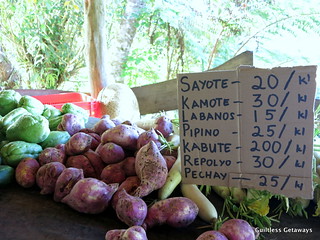
I asked about their fertilizers like if they have vermiculture here. Mr. Dion said that they buy from the locals here to support their livelihood and because the ants kept getting the eggs so it's not ideal for this farm. As for the ants, they use Zeolite (agricultural lime) to keep them at bay.
If you're not that much into organic food or you're looking for local specialty pasalubongs, we passed by Mer-Nel's Place (for the chocolate cake) and Letty's Buko Pie along the Los Banos route on our way back to Manila.
Farm Details:
Bangkong Kahoy BK Valley Nature Retreat & Field Study Center in Dolores, Quezon near Mt. Banahaw-Cristobal
Mr. Dionisio "Dion" Pullan and Ms. Jing Pullan
Bangkong Kahoy BK Valley Nature Retreat & Field Study Center in Dolores, Quezon near Mt. Banahaw-Cristobal
Mr. Dionisio "Dion" Pullan and Ms. Jing Pullan
Sitio Bangkong Kahoy, Brgy. Kinabuhayan,
Dolores, Quezon Province 4326
How to Go to Bangkong Kahoy Valley Resort Nature Retreat & Field Study Center Directions:
By car -
From SLEX, taking on the new link tollway to STAR Toll way. Do not enter STAR Toll way but exit to Sto. Tomas. Take the National Highway heading towards Alaminos, San Pablo City & Lucena City. Take the by-pass road which curves right after SM San Pablo. After passing the San Pablo Meralco office, take a left turn towards Dolores. From Dolores, go to Brgy. Kinabuhayan. Turn left before entering Kinabuhayan proper and go up the mountain (about 2 km.) to the BK Valley Resort. - Source
By commute -
Take Manila to Lucena bus. Get off at 7-11 San Pablo (near public market). Take a jeepney bound for Kinabuhayan and get off at junction foing to Bangkong Kahoy. Either trek 2 km. up or arrange for pickup via their hummer for a fee. - Source
To visit the different ATI-assisted projects (Organic Farming Learning Sites), you can drop by or ask the ATI Regional Training Center nearest you or inquire through:
Call -
982AGRI (982-2474) for Metro Manila calls
1-800-10-982AGRI (1-800-10-9822474) for provincial toll-free calls using PLDT landlines
Text -
For Smart and Talk & Text Subscribers, send a message to 391-DA (391-32).
For non-Smart Subscribers, send a message to 0920-946AGRI (0920-9462474).
